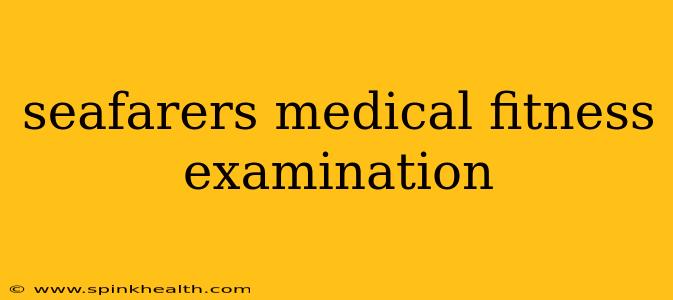The salty spray on your face, the creak of the ship under your feet – the life of a seafarer is filled with adventure and challenges. But before you can set sail on your next voyage, there's a crucial hurdle to overcome: the seafarers' medical fitness examination. This isn't just a formality; it's a vital safeguard for your health, the safety of your crew, and the successful operation of the vessel. This comprehensive guide unravels the complexities of this essential examination, answering your most pressing questions.
What is a Seafarer's Medical Fitness Examination?
Imagine a rigorous health check-up, but tailored specifically to the unique demands of life at sea. That's essentially what a seafarer's medical fitness examination is. It's a thorough assessment designed to determine if you're physically and mentally fit to perform your duties safely and effectively on a ship. The examination goes beyond a standard check-up, delving into aspects directly relevant to maritime work, such as vision, hearing, and cardiovascular health. The goal? To prevent accidents, illness outbreaks, and ensure the overall well-being of everyone on board.
Think of it like this: a pilot needs to pass stringent physicals before flying a plane; a seafarer needs a similar level of medical clearance to navigate the complexities of the ocean.
What are the Specific Requirements for a Seafarer's Medical Fitness Examination?
The exact requirements for a seafarer's medical fitness examination can vary slightly depending on the country, the flag state of the vessel, and the specific role of the seafarer. However, certain common elements consistently appear across most jurisdictions:
-
Visual Acuity: Clear vision is paramount for navigating and performing various tasks on board. The examination includes tests for both distance and near vision.
-
Hearing Acuity: The ability to hear alarms, communication signals, and distress calls is crucial for safety at sea. A hearing test is a key component of the examination.
-
Cardiovascular Health: Stress and exertion are common aspects of maritime life. The examination typically includes an electrocardiogram (ECG) and blood pressure check.
-
Mental Health: Maintaining mental well-being is crucial in potentially stressful and isolated environments. Some examinations include a basic assessment of mental fitness.
-
Drug and Alcohol Screening: Maritime safety demands a drug and alcohol-free environment. Screening for substance abuse is a standard procedure.
-
Specific Medical Conditions: Depending on your role and the nature of your work, the medical examiner will look for any conditions that might impair your ability to perform your duties safely. This may include respiratory conditions, neurological issues, or other health concerns.
What are the Different Types of Medical Certificates for Seafarers?
The type of medical certificate you need depends on your role and the duration of your employment. For instance, a short-term voyage might require a different certification than a long-term contract. The issuing authority, usually a designated medical examiner approved by the relevant maritime authorities, will provide the appropriate documentation.
How Often Do I Need a Seafarer's Medical Fitness Examination?
The frequency of medical examinations varies. Regulations usually stipulate the timeframe, which could range from every few months to several years, depending on age, health status, and the type of work you perform. Your medical certificate will outline the timeframe for your next examination.
What Happens If I Fail the Medical Examination?
If you don't meet the required medical standards, you might not be deemed fit for sea duty. This doesn't necessarily mean the end of your career. It might involve seeking further medical treatment, addressing specific health concerns, and retaking the examination once your health improves.
Where Can I Find a Designated Medical Examiner for Seafarers?
The location of designated medical examiners varies by location. You should contact your employer or your country's maritime authority for details on accredited physicians authorized to conduct these examinations.
What are the Consequences of Not Having a Valid Medical Certificate?
Sailing without a valid medical certificate can have serious consequences, including legal repercussions and penalties, not to mention jeopardizing your health and the safety of others on board.
The seafarer's medical fitness examination is more than a simple health check; it's a crucial step in ensuring the safety and well-being of everyone involved in the maritime industry. By understanding the process and requirements, seafarers can navigate the complexities of the examination and continue their careers with confidence. Remember, your health and the safety of others are paramount.

